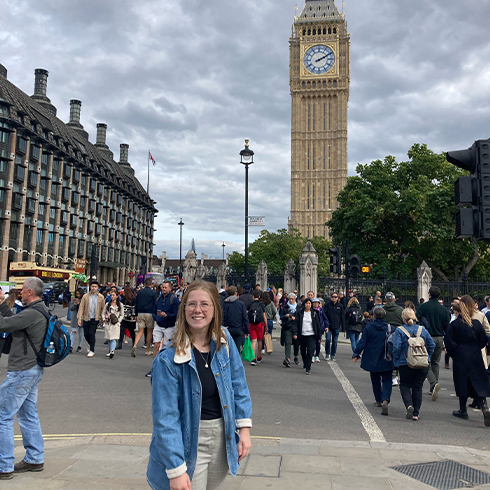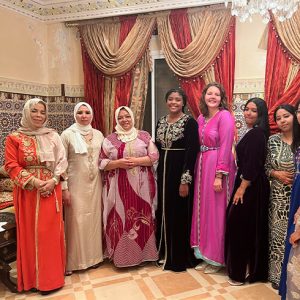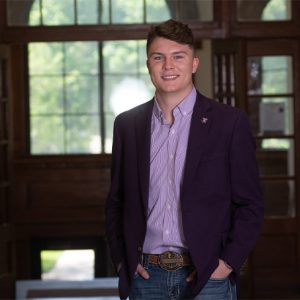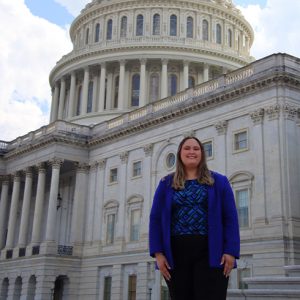
Swipe For More >
Where Are They Now? Fostering the Future through the Kansas Sorghum Fellowship Program
Since 2020, a collaboration between National Sorghum Producers, Kansas Grain Sorghum and Kansas State University has fostered a landmark fellowship program based in Manhattan, developing K-Staters with deeper understandings of sorghum. Four bright young fellows have completed this program and each have carried their experiences with sorghum producers into the folds of their professional journeys to conduct new and exciting impacts all their own.
This fellowship began as farmers increasingly gained the ability to measure farm practices for improving soil and water health. If that sounds familiar, it’s the heart of NSP’s recent $65 million Partnership for Climate-Smart Commodities grant awarded last September. Prior to that grant, however, NSP implemented another project focused on quantifying conservation practices for farm profitability. Funded through a U.S. Department of Agriculture NRCS grant led by NSP’s John Duff, “KansCAT” honed in on Western Kansas sorghum producers’ data to create and apply technology for conservation of soil and water systems that met increasing industry data needs.
For this grassroots effort, Kansas Grain Sorghum and NSP swiftly became hosts to K-State’s premiere Flinchbaugh Food and Ag Policy Fellowship program, curated by K-State’s Associate Director for Agriculture and Extension Susan Metzger, creating the Kansas Sorghum Fellowship. This program encompasses sorghum production, conservation, markets and policies, as well as youth development from within the state with truly global impacts. We caught up with the past fellows:
 Reed Middleton of Hermiston, Oregon, led the Kansas Sorghum Fellowship program as its inaugural fellow. Her takeaway? “Application,” Reed said. “I will forever advocate that applying content learned in the classroom to ‘real-world’ situations is the key to truly learning. The work I did with sorghum, whether networking, data collection or practicing and applying the curriculum were great ways to solidify my understanding.”
Reed Middleton of Hermiston, Oregon, led the Kansas Sorghum Fellowship program as its inaugural fellow. Her takeaway? “Application,” Reed said. “I will forever advocate that applying content learned in the classroom to ‘real-world’ situations is the key to truly learning. The work I did with sorghum, whether networking, data collection or practicing and applying the curriculum were great ways to solidify my understanding.”
Since completing the Kansas Sorghum Fellowship, Reed has been a recipient of the National Sorghum Foundation Bill Kubecka Memorial Scholarship, conducted work to monitor and evaluate the Poultry Value Chain in Ghana, studied abroad in Montevideo, spent time in Uruguay experiencing the Uruguayan beef industry and in her spare time travels the U.S. with a local nonprofit, teaching individuals with disabilities how to ride bicycles. Reed is currently in Reading, England, completing her master’s level course in food economics and marketing. Afterward, she plans to work on research surrounding global food security, focusing on the challenges and opportunities surrounding gender and agricultural development.
“I will forever advocate that applying content learned in the classroom to ‘real-world’ situations is the key to truly learning. The work I did with sorghum, whether networking, data collection or practicing and applying the curriculum were great ways to solidify my understanding.”
 Sanders Barbee of Lawrence, Kansas, grew up outside of agriculture but found her home at K-State and became an officer of its Minorities in Agriculture, Natural Resources and Related Sciences (MANRRS) chapter by way of Tuskegee University’s Vet-Step program for youth. She realized her ambitions extended beyond veterinary medicine and grew passionate about farmers and their communities. She jumped at the Kansas Sorghum Fellowship opportunity during her sophomore year.
Sanders Barbee of Lawrence, Kansas, grew up outside of agriculture but found her home at K-State and became an officer of its Minorities in Agriculture, Natural Resources and Related Sciences (MANRRS) chapter by way of Tuskegee University’s Vet-Step program for youth. She realized her ambitions extended beyond veterinary medicine and grew passionate about farmers and their communities. She jumped at the Kansas Sorghum Fellowship opportunity during her sophomore year.
“My time with both state and national sorghum organizations helped expand my knowledge of food and ag policy. I saw many ways to positively affect ag policy and witnessed the legislative and regulatory process up close. I loved getting to work one-on-one with Kansas producers,” Sanders said.
Afterward, Sanders visited Morocco on a farm exchange internship, sponsored by the United Sorghum Checkoff Program, working with Moroccan farmers dealing with harsh conditions and food insecurity. Sanders now works at the Sustainable Intensification Innovation Lab, a USAID Feed the Future project, specializing in international communications. She will travel to Senegal to visit projects her lab has funded and plans to continue her work to increase conservation and sustainability efforts in agriculture.
 Parker Vulgamore of Scott City, Kansas, has deep roots in Kansas agriculture as the sixth generation of his family’s farm.“The opportunity to intern with the sorghum associations was one of the most rewarding experiences of my undergraduate career,” Parker recounted. “I gained connections and mentors who provided invaluable support that led to future internships and aspirations.” Since working in the sorghum industry, Parker has completed two congressional internships, a successful term as the K-State’s student body president and graduated with a bachelor’s degree in agricultural economics.
Parker Vulgamore of Scott City, Kansas, has deep roots in Kansas agriculture as the sixth generation of his family’s farm.“The opportunity to intern with the sorghum associations was one of the most rewarding experiences of my undergraduate career,” Parker recounted. “I gained connections and mentors who provided invaluable support that led to future internships and aspirations.” Since working in the sorghum industry, Parker has completed two congressional internships, a successful term as the K-State’s student body president and graduated with a bachelor’s degree in agricultural economics.
“My connections from the sorghum industry have continued to enrich my life. This summer, I caught up with many friends and colleagues at the Global Sorghum Conference in Montpellier, France,” continued Parker, “I expanded my sorghum network to all over the world.”
Parker is now pursuing his master’s degree in agricultural economics at K-State focusing research on sorghum specifically as part of a larger farm income and financial stress model. Ultimately, his plan is to help finalize and deploy this model as a tool for decision-makers to enhance support for the industry.
“The opportunity to intern with the sorghum associations was one of the most rewarding experiences of my undergraduate career. I gained connections and mentors who provided invaluable support that led to future internships and aspirations.”
 Adelaide Easter of Salina, Kansas, is the latest graduate of the Kansas Sorghum Fellowship. She recalled how significantly she grew during one semester.
Adelaide Easter of Salina, Kansas, is the latest graduate of the Kansas Sorghum Fellowship. She recalled how significantly she grew during one semester.
“I grew a lot during one semester learning about sorghum’s health benefits to policy issues essential to sorghum producers,” Adelaide said. “I was surrounded by people who wanted to do whatever they could to help me, giving me advice, teaching me about a topic or helping me think of the next steps for the future. I felt supported in my aspirations.”
She is currently completing a congressional internship in Washington, D.C. She plans to return to K-State as a junior studying agricultural economics and Global Food Systems Leadership.
Each sorghum fellow receives a book called Surviving Inside Congress and each week, “I learned about the inner workings of government,” she continued. “After just finishing my fellowship with Kansas Grain Sorghum, I am interning in Washington, D.C., for Senator Jerry Moran from Kansas. This opportunity is enabling me to see firsthand what issues affect Kansas and how the Senator and his office advocate for Kansans.”
The U.S. sorghum industry values the collaborations necessary for its advancement into the future. Whether with allied advocacy groups concerning effective farm policy, industry partners enhancing crop profitability or within academia fostering the next generation of top agriculturists–the Kansas Sorghum Fellowship program hits the mark.
###
This story originally appeared in the Summer 2023 Issue of Sorghum Grower magazine.


